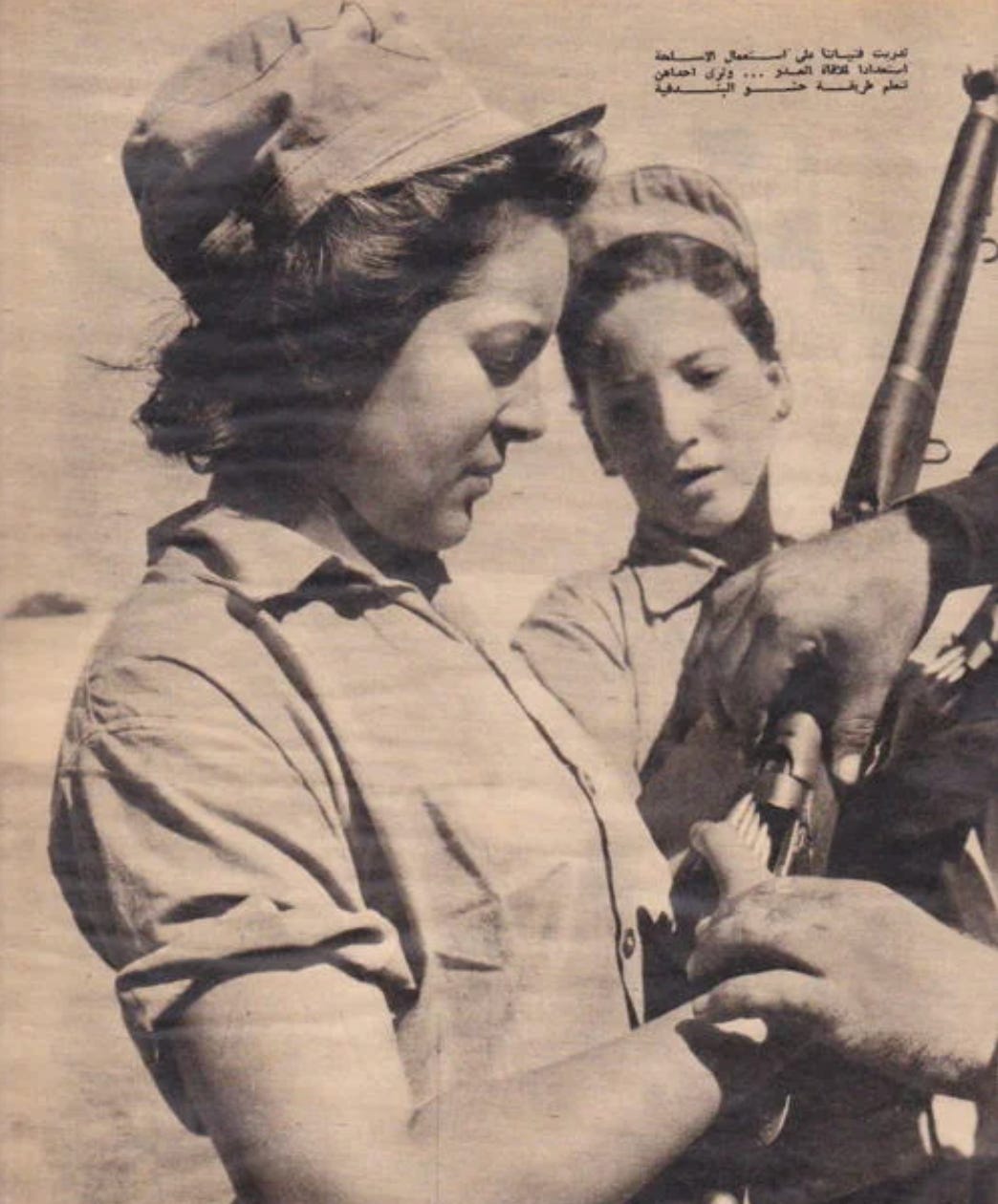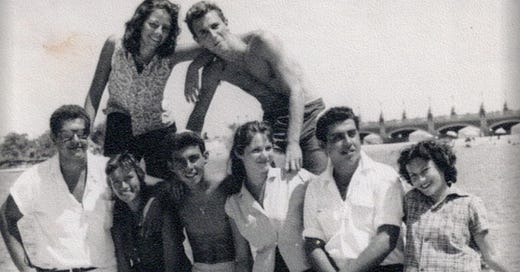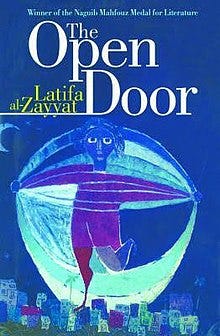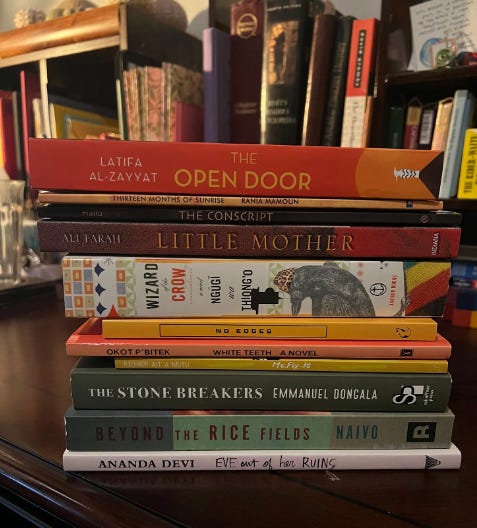The Feminist Egyptian Novel That Shook the World
You either know it or you don't
In my journey around the world in translation, I’ve found books several ways: I’ve asked knowledgeable people for recommendations, I’ve scoured reading lists, and I’ve thrown myself at the mercy of the Google search results for things like “Croatian poetry.” I honestly can’t remember which of those things led me to The Open Door, the groundbreaking 1960 feminist novel by Egyptian writer Latifa al-Zayyat, but here we are.

This is a book that I appreciated more for its historical impact (more on that in a minute) than the story itself—one that’s filled in a cultural gap I didn’t know I had. The English translation is by Marilyn Booth and published by Hoopoe Fiction, an otherwise lovely press that for some reason gave it this unforgivable Egypt=pyramids cover design:
That’s the 2017 reprint, but Booth’s English translation originally appeared in 2000 from American University in Cairo Press, and this cover is a much better representation: a young woman in a city, emerging into something new:
Written in colloquial Egyptian Arabic (a bold and important and controversial move at the time) the novel follows a middle-class Cairo girl's coming of age through a succession of unsatisfying relationships with men, and through her growing political awakening and empowerment.
We meet Layla in early adolescence, just before her father has a full-blown temper tantrum over her first period. A few years later, she’s in romantic thrall to her overbearing first cousin (a relationship we’re meant to take seriously—incest doesn’t seem to be a concern here in any way—but that I had a hard time with, which of course is my own cultural baggage). She then meets her brother’s friend Husayn, a great match whom she isn’t open to in the wake of the cousin fiasco. Then she becomes engaged to a professor at her college, a man who belongs in the museum of smarmy and controlling men next to George Eliot’s Casauban. (He wants to marry her because “you are compliant and quiet, and you listen to me, and you do what I say.” How charming!) She manages her own escape from him in the end, sneakily getting herself transferred to a teaching post in Port Said; the scene where she accomplishes this is my favorite in the book.
Meanwhile, her one true love is her brother, Mahmoud; she adores him and fundamentally wants to be him. Early in the book, the Egyptian nationalist movement is building in the background, and Mahmoud is out in the streets, protesting English rule—while Layla, who takes only a modest part in a small student protest, is severely punished by her father. Later, at university, she trains as a nationalist fighter. And the story ends with the 1956 Suez Crisis, when British, French, and Israeli forces invaded in response to Nasser's nationalization of the canal, and Egyptian nationalist fighters took to the streets to defend the canal zone and the country. Port Said, the city Layla has escaped to, is the center of the action.
In any novel or story, I watch for what a character is capable of at the end that they weren’t capable of in the beginning. And by the end of The Open Door, the formerly meek Layla is out there shooting people dead. (It’s not an unrealistic portrayal; many women volunteered. Today, though, women it Egypt are limited to administrative or nursing roles in the military.)

Layla is also capable of opening her heart to true love (that’s the “open door” of the title). This is very much a bildungsroman, and so the big plot question—as with all of these stories, from David Copperfield to Black Boy—is “Let’s see exactly how this person turns out.” Adulthood is the finish line, and we’re watching the process. It’s riveting for many of the same reasons it’s riveting to watch someone decorate a cake on TV.
These two spheres—the romantic and the political—battle for control of the novel’s heart. You could read this story as Layla’s claiming control over both her romantic and political self—or you could argue that in the end, Layla’s political coming of age renders all the romance stuff moot. Who cares about love when there are paratroopers to shoot?
(As a side note, I’ve been indirectly fascinated with the 1956 Suez crisis for a long time, if only because it happened nearly simultaneously with the 1956 Hungarian Revolution, in which my father took part. The Egyptian fighting took place from October 29th to November 7th, while the failed Hungarian uprising lasted from October 23rd to November 4th. Given the amount of flexing in both regions from both the US and USSR, either incident might have gone differently without the other. But that’s a doctoral dissertation for another day.)
It was tempting to read The Open Door as a roman à clef—it has all the markings of an author writing about herself but changing a few names—and yet the parallels aren’t tidy. Al-Zayyat, for one thing, was a generation older than fictional Layla. Layla takes part in the 1946 demonstrations as young adolescent, while al-Zayyat was 23 and a leader of the student movement. (She was arrested and detained, and she was imprisoned again in 1981 for her work against the Camp David Accords.) Still, at its worst moments the book reads like being trapped in a cafe with a friend who can’t stop analyzing her own love life in excruciating detail. This is one of those times when I’m grateful to be reading with my writer-snob hat off; I’m not here to see how this measures up to other literature of the modern moment, but to appreciate the book for what it is.
Related: It’s always hard to tell, in translation, if any mawkishness or cliche is the responsibility of the translator or the author—or simply a matter of what sounded great in one language sounding a little silly in another. While there’s brilliant, powerful writing tempering the endemic melodrama throughout, the last line of the English version (no great spoiler, given what I’ve said above) is: "Eyes awash with the depth of his feelings, Husayn said, “This is just the beginning, my love.” Anyone reading this who’s ever studied with me has some idea of what I’d scrawl in the margins there.
But then one of the biggest reasons to read this novel is to understand its impact, which was seismic enough that we all ought to know this book, or at least know about it.
Here’s the novelist Hala El Badry, speaking in 1996: “In my childhood, the name ‘Latifa al-Zayyat’ echoed around me as one of the icons of national liberation. The great writer remained in my imagination merely a name, until the film version of The Open Door came out. Our home witnessed many conversations about the boldness of its themes…”
The 1963 movie seems to have done to this book what The Thorn Birds or Brideshead Revisited did to those novels—canonizing, if not supplanting them.
There’s plenty more to say here—for one thing, I’d recommend this novel to any writer who wants an example of a book that’s mostly in one point of view but feels free to jump into other characters’ heads on occasion (or, in one devastating scene near the end, to give us an omniscient story about characters we haven’t met before)—but I’ll leave it at that for now and invite anyone who’s read this, or anyone who reads it in the future and comes back to the post, to leave comments below.
I’ve been thrilled at how many people are reading along with me, and I’d especially encourage you to read along over the next few books if you haven’t read enough from Africa (or if all your African literature has come from South Africa and Nigeria).
So, moving down this stack a little…
… up next is Thirteen Months of Sunrise, a very short story collection from the Sudanese author Rania Mamoun (b. 1979).
I’m one story in and loving it… And I’m pretty sure this is the first Sudanese literature I’ve read. If you were ever going to join me but were waiting for the shortest book possible, this is probably the one, so jump on it.











I haven't read the book, I just want to say I saw a documentary on French TV focusing on crucial moment in the 20th century, and this one was all about October/November 1956, Hungary and the Suez Crisis. It fascinates me how disparate crises seem to converge temporally -- and I would bet there IS a doctoral dissertation on this!
I'm trying to see the rest of your reading list! Can you share the titles and authors please so I can add them to my own list of reading? I love everything you read and write!